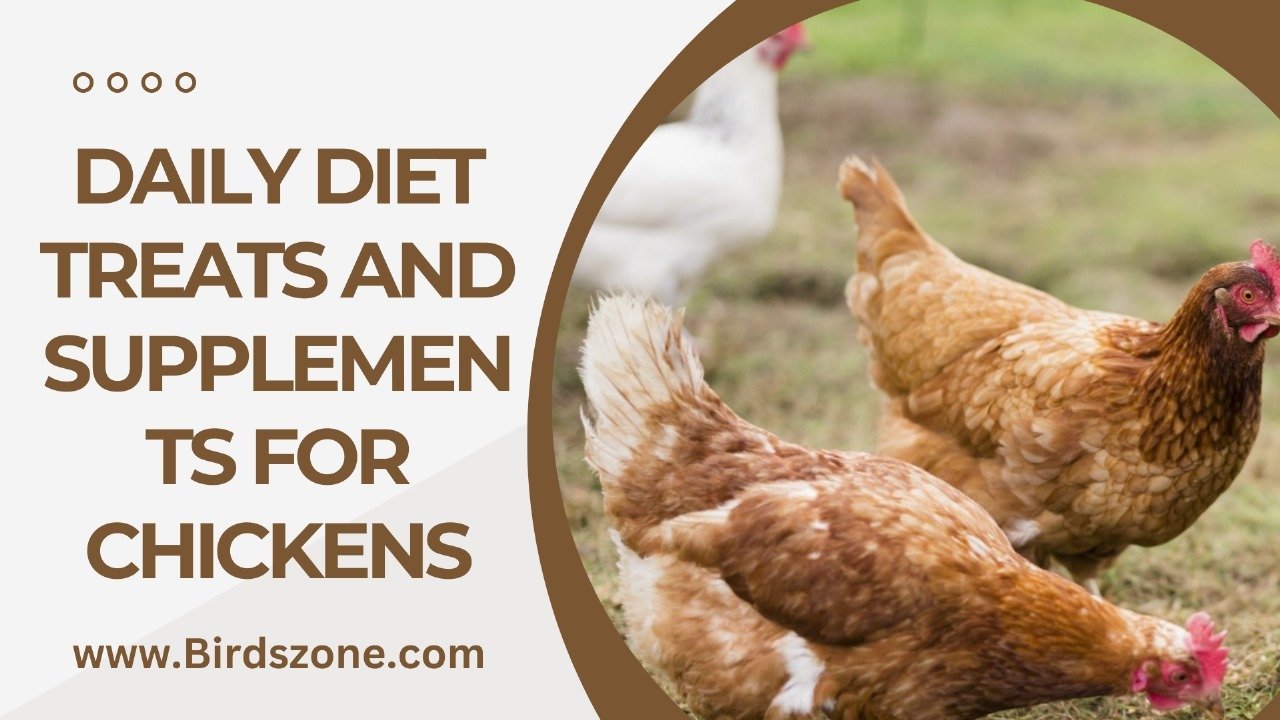Daily Diet Treats and Supplements for Chickens. If you’ve come across this source it is likely that there are particular chickens. That would like you to add with the desirable possible care! The caring and long-term care offered to chickens in sanctuary for animals is based on the meals they’re fed. Even though chickens are all unique that have different preference and requirements however. There are certain general rules to take into consideration in their physiology and nutrition needs!
In the case of feeding chickens. It is easy to be overwhelme at first with the sheer number of options and the amount of information available in the world. If you first understand what is the most essential requirements for chickens so that you are able to make inform decisions on how you supply and feed your flock, and also be armed with the information to support your decision.
What Does A Chicken Need?

Just like all other animals Chickens also have special nutritional requirements which must meet. To benefit keep them happy and healthy, birds need the following things:
Protein
A good protein source is vital to the development of their muscles as well as overall health. This is particularly applicable to hens who lay eggs. To the hens, one egg laid is the nutrition loss equivalent to a human having a child daily! Protein loss has to be compensate for through their diet (or could be reduce via the implantation process). Mix soybeans into dishes for your hens daily to bring extra protein as well as allowing. The chickens to eat egg yolks that they have made themselves. If they are able to access the outdoors they can also eat bugs and worms. This gives them protein and a source of entertainment.
Grains
Grains can be describe as any tiny tough grass seeds such as corn, oats, or wheat. These bring Vitamin B, Vitamin E as well as phosphorus as well as a energy boost when you feed them as whole grains. When you spread a complete cereal chicken scratch over the backyard, the chickens will enjoy two benefits: food along with some hunting and pecking enjoyment! A whole grain scratch is more beneficial than a simple scratch made of cracked corn. It is important to note that scratch grains are only 10% of a bird’s daily diet because they’re in no way nutritionally sufficient source of protein. It is crucial to be aware that the grains should not allow to become damp and spongy.
Greens
In addition to many other benefits Fresh greens add Vitamin E vital to the chicken’s immune system and also Riboflavin. Vitamin A, as well as Calcium. If you own a garden and you have a green lawn, it’s easy to serve for your chickens. Allow them to roam around the grass, and they’ll reap certain benefits be sure to not let chickens into your backyard if the area has been cover in pesticides! It is also possible to feed your chickens nutritious greens as well as some leftover greens. But stay clear of those known to be poisonous (see “Things that are toxic to chickens” further down).
Insoluble Grit
Do not confuse it with the classic diner, insoluble grit. Small stones, or sand swallowed by birds benefit digestion of the food. refers to small solid rocks and small pebbles that chickens swallow in for aid in digestion of food inside their gizzards. the muscular expansion that is the intestinal tract birds, which usually has large muscular walls, as well as an extremely tough and horny lining that is used to grind the food. in the event that the crop is present, it will follow it, as well as the proventriculus as they do not have teeth. If the birds are in free range and free to roam, they’ll manage the grit needs of by themselves. If they are in a cage it is necessary to focus on providing your birds with grit that is hard each month, at minimum.
It is important to assure that the material is of the right size to the bird that is in your custody; a chicken can’t take on anything larger than the sand! There is also the opportunity of leaving the grit in a bucket to chickens. Who can access it when they wish. When chickens do not have sufficient grit they could develop digestive issues like an affected crop The term crop refers to one of the pouched extensions to the esophagus, a part of birds, which serves as a container for food as well as for the initial process of maceration.. But, large breed chickens could require their grit rationed carefully. Because some are known to consume all of the grit fed to them at once.
Calcium & Vitamin A
If the bird eats enough greens or specially-formulated foods, they’ll receive ample amounts of calcium and vitamin A. It is recommend to check eggs of hens and check their shells. If they have a soft shell, there is a possibility that they are calcium deficient and might require supplementation to guard against osteoporosis or reproductive disease (though there are other causes that can lead to soft eggs and you must make sure you consult your vet prior to making any decisions). Laying hens need up to 3 times the calcium as non-laying hens do, which is why it’s crucial to have more calcium sources prepared, such as the natural sources of the black sunflower seed.
Vitamin D
Vitamin D is normally create in the body of a chicken due to exposure to light (just the way we humans do!). If you’re in an area where there are prolonge periods of darkness or cloudy conditions, such as those in Pacific Northwest. It’s important to favor poultry with an extra dose in the form of Vitamin D, especially in Vitamin D3 form. It is believe that a Vitamin D lack within chickens may result in fragil bones and fragile shells. Kelp is an extremely popular food supply for Vitamin D for chickens.
Water
This is a no-brainer however, chickens require fresh daily water! Keep the water near the coop to warrant it’s readily available. Also, warrant that the water is clean as (probably as you) chickens won’t consume water that is dirty. You should consider investing in a poultry fountain to reduce water loss and increase sanitation. When it gets cold the time of winter, ensure that their water source does not freeze! Make sure to use a safe water heater for barns when needed.
Types Of Food
There are different varieties of commercial food that are market to chickens at different life stages and breeds. Most of them offer the complete nutritional requirements to chickens, without the use of antimicrobials, hormones, or byproducts of animals. Sadly, some foods are design specifically with exploitationExploitation is characterize by the abuse of a position of physical, psychological, emotional, social, or economic vulnerability to obtain agreement from someone (e.g., humans and nonhuman animals) or something (e.g, land and water) that is unable to reasonably refuse an offer or demand.
Additionally, it can be characterize as the excessive pursuit of self recieve that is at the cost of someone else’s health, wellbeing, or life. With this in mind, there are foods like “broiler” food (often called “meatbird”) which is specifically design to stimulate quick expansion as well as weight obtain and shouldn’t be utilize in a sanctuary. The majority of complete diet food items are in crumble, pellet, or mash, and are preferred over mix grains since they keep chickens from deciding and picking (and not getting the vital nutrition). A lot of sanctuaries select between “layer” food and “maintenance” foods based on the requirements of the residents who are in their care.
Feeding Non-Large Breed Chickens
The chickens that are bred to produce eggs (or “ornamental” hens who are currently laying eggs should eat “layer” food, because it is specifically design to help compensate the nutritional deficiency cause by egg-laying. There are a variety of high-quality full food “layer” foods on the market, with organic versions. The most popular among sanctuary owners is Layena. To provide more calcium intake, some sanctuary prepare and feed back eggs laid by hens, their shells and the rest of it. There is more information on the factors to take into consideration in deciding whether to feed the eggs of residents back to them.
Smaller breed of chickens
If you’re feeding smaller breed of chickens that have stopped laying due to age or are implante or implante. You might require adjusting their diet by adjusting their overall calories or the protein ratios. They also don’t typically require the extra protein or calcium they get from the calcium and protein that “layer” food provides. A few options that are recommend for smaller breed chickens not layers are Roudybush Lower Fat Maintenance Purina Game Bird Maintenance Chow as well as an “All Flock” food. Roudybush is a top-quality food item, however it is costly which means it’s not the ideal opportunity for all. When choosing a “All Flock” food, take note that various brand names have different formulas that include significant amounts of protein. Be sure to take a examine the nutritional information before making a decision on what food to buy.
Large breed chickens that are not non-natives must be provided with free choice food. Which means they will have access unlimited amounts of food much of the day. Alongside their primary diet, scratch may be offer as a treat or as a reward for chickens however. It should not comprise less than 10percent of the food intake because it’s not nutritiously balance. An exclusively scratch-based diet could cause nutritional deficiency. Also, consider offering fresh vegetables like regular greens or a rare dessert.
Feeding Large Breed Chickens
Who are We Really Talking About When We say “Large Breed Domesticate animal breeds that have been selectively bred by humans to grow as large as possible, as quickly as possible, to the detriment of their health. Chickens?”
The word “large breed” to refer to Cornish crosses and chickens that have been develop to increase their size quickly – perhaps however, not as rapidly as Cornish crosses but more quickly than the other breeds and generally referred to by the name of “free-range broilers.” As as a whole, they’re frequently referred to as “colored hybrid broilers” but contain a myriad of trade names, including Freedom Ranger, Red Ranger and Kosher King. Although other chicken breeds like Orpingtons or Jersey Giants, are sometimes reared for their meat however. They don’t have similar challenges to Cornish crosses, and are not considered to are classified as “free-range broilers,” and do not belong to the category we’re using when we talk about “large breed.”
Large breed poultry
In particular, when you care to large breed poultry. It is vital to be vigilant about the quantity of food you’re giving them since they’ve been selectively bred to rise their size rapidly, in the direction of their overall health. The desirable thing to do is weigh an adult large breed chicken once a month. As well as monitoring their health in order to assure they’re maintaining an appropriate weight. The mature male chicken is typically around 10-18 pounds.
A mature female of the large breed usually weighs between 8 and 12 pounds. Some could be naturally heavier than others. As each chicken is unique and has their own weight, being attentive to the condition of your body is beneficial. Healthy large breed chickens is likely to have a substantial muscle mass both sides of the bones of the keel. The keel is not visible and could be slightly receding in comparison to the muscles of the breast.
Large breed chickens
Large breed chickens should not feed “free choice” as they eat anything that is in their sight. This means that they may require your chickens in a distinct living space in a separate area from the other varieties of chicken that are fed an omnivore diet. Large breed poultry are predispose to developing arthritis, obesity as well as gout or heart attacks. It is important to keep an eye on the health of your chicken and their weight because there’s not much knowledge about their nutritional requirements in the long run. It is possible to alter the amount of food they consume all through the year, for instance during the spring season where they will be able to find more bugs and vegetation to consume within their outdoor spaces. Large breed chickens need pellets every day and get additional greens.
The excellent place to start is to impart roosters with 1/3 cup of feed per feeding and the hens 1/4 cup food each feeding, along with some greens. You don’t want to overload them, feeding the birds too much is risky for their nutritional health and well-being Try to figure out the right weight-maintenance level of food per one bird of large breed that you care for. Due to the speed at which and eagerly they consume food the food. Chickens of large breed are known to swallow tiny pieces of food. So, it’s desirable to immerse them in meals with a meal. That is crumbled or mash and avoid giving dry pellets, if they seem to be powdery.
If your birds are laid eggs, feed them an “layer” food (like Layena) in controlle portions. They are not you can feed them low protein and high calcium diet like Purina Game Bird Management as well as Roudybush low fat maintenance. If you intend to switch the food they eat when egg production ends or begins and they are transitioning slowly into the new diet and monitor them closely to assure they do not experience negative health effects because of the new food formulation.
Be sure that you have satisfying space around the feeders. That you have to allow every bird of a large breed to receive their fair part of their food. If any bird is exclude, it is your responsibility to favor additional space to warrant. That no one suffers malnutrition or other complications from eating too much.
Eating choices
Observers have noted that large breed poultry can eat gritty food of their choice until they fill the grazing area, which can lead to severe digestive problems. Take care to track their consumption and restrict their intake to portions. That are controlled if big breed animals seem to be to be a little too fond of pebbles! A majority of the recommendations on insoluble grit are for smaller breed chickens and advise free choice access. When speaking with some of the experienced big breed poultry caretakers it is apparent. That if chickens are allow access to an area outside that has small sized pebbles for a short period duration. They’ll most likely be able to discover suitable natural grit in order to warrant adequate digestion throughout the year. If you think the large breed chickens require supplementary insoluble grit however.
You have discovered that you are unable to give it away for free. Then it is possible to talk about ways to make sure you are supplementing safely with your vet. Based on information gathered from the sanctuary population. We believe you’ll require only just a tiny amount and offer it often.
Suggestions For Food Storage
Alongside feeding good quality diet and ensuring that you store food in a safe manner in order to warrant that your guests reap the benefits of nutrition. Foods will last perfect when stored in a dry, cool in a dark, dry place. You must keep every food item, even unopened bags, in tightly sealed metal cans or containers to prevent rodents and other pests from infiltrating the food. Contact the manufacturer for information on their suggested shelf-life, however generally. Properly stored bags of food lasts for about three months. Food that is store too long or in unsuitable conditions could cause the food becoming rotten or sour and spoil food. But also causes food items to deplete in minerals and vitamins. Make sure you not feed moldy or rancid foods to your chickens because it could make them extremely sick.
Things That Are Toxic To Chickens
There are numerous food items that could contain toxins which are substances that chickens can’t take in or digest. Find our listing of food items that are potentially toxic in this article.
Poisonous Plants To Avoid
There are many of plants you need to take steps to block chickens from gaining access to. It’s essential to become familiar with these plant species to ensure your chickens’ safety. that you keep.
Appropriate Treats For Chickens
It’s a good practice to offer some treats available for your family. They will be happy, and is also motivational factor if you have to get your flock to visit an area. The perfect treats are:
- Fruits and vegetables (but stay clear of moldy, toxic or decaying fruits and veggies!)
- Oatmeal and scratch grains such as crack corn should be consume in moderate amounts
- Fresh tomato, chopped the lettuce and kale into pieces, slice apples, toast bits certain seeds
- Warm (but it’s not very spicy) frozen corn
- Kale, cabbage, or heads of lettuce hanging from the string for a fun food item
- Brown rice and butternut squash are cook, then mashed to make a delicious dessert
Treat Temperance
Remember that they should only be add to their food, but not the majority of it!
Natural Supplements For Chickens
It is recommend to consult an avian or veterinarian before deciding on the accurate way to deal with problems with your chicken’s health, since the natural cures are rarely effective as the only solution to various ailments, particularly in the case of inflammation or pain. There have been studies that have shown benefits of certain supplements that chickens can incorporate into their diet. Below are some supplements that are natural which you could use in conjunction with the medical treatments to benefit to keep your flock healthy:
- Cinnamon as well as Epsom salts may benefit reduce the severity of diarrhea.
- FlaxseedWhen together flaxseed in the form of an animal food supplement. It needs to be crush, and not eaten as a whole. Think about with an unclean coffee mill and pulverizing the seeds before you feed to maximize the effectiveness! Chopping grapes and sprinkling cinnamon over them can help treat inflammation and reduce the size of tumors in ovarian cancer.
- Garlic powdered or chopped can serve to benefit get rid of worms
- Aloe vera (3 tablespoons in a gallon water) is a great choice to benefit combat coccidiosis.
- Apple cider vinegar in water can help eliminate internal parasites
Should Chickens Take Probiotics?
In short “only if the chickens need them”. Probiotics are supplements to your diet which improve the number of gut bacteria which benefit to process food items in the digestive tract. Gut health is also a way to fight the harmful bacteria before they become a part of the body.
Also, it can decrease Salmonella as well as E. E. coli levels in eggs. If you’ve got an adult, healthy chicken there’s no reason not to change their gut flora using probiotics. If your chicken is taking antibiotics in order to combat an infection in the gut. Then the gut flora that is healthy and beneficial is likely to be destroy also, which is why probiotics could be an effective option to warrant they are healthy. After they’ve finished their treatment with antibiotics then you could provide them with probiotics for up to a week or so. It can stimulate the appetite of a chicken recovering as well as nutritional absorption as well as the immune system. There’s a variety of poultry probiotics available in a myriad of varieties.
There are a lot of considerations to make in your daily requirements and needs of chickens. But do not get stresseD with the whole thing! Keep it simple beginning and gradually altering based on what birds your care want. The birds will notify you when changes need to be implement!



